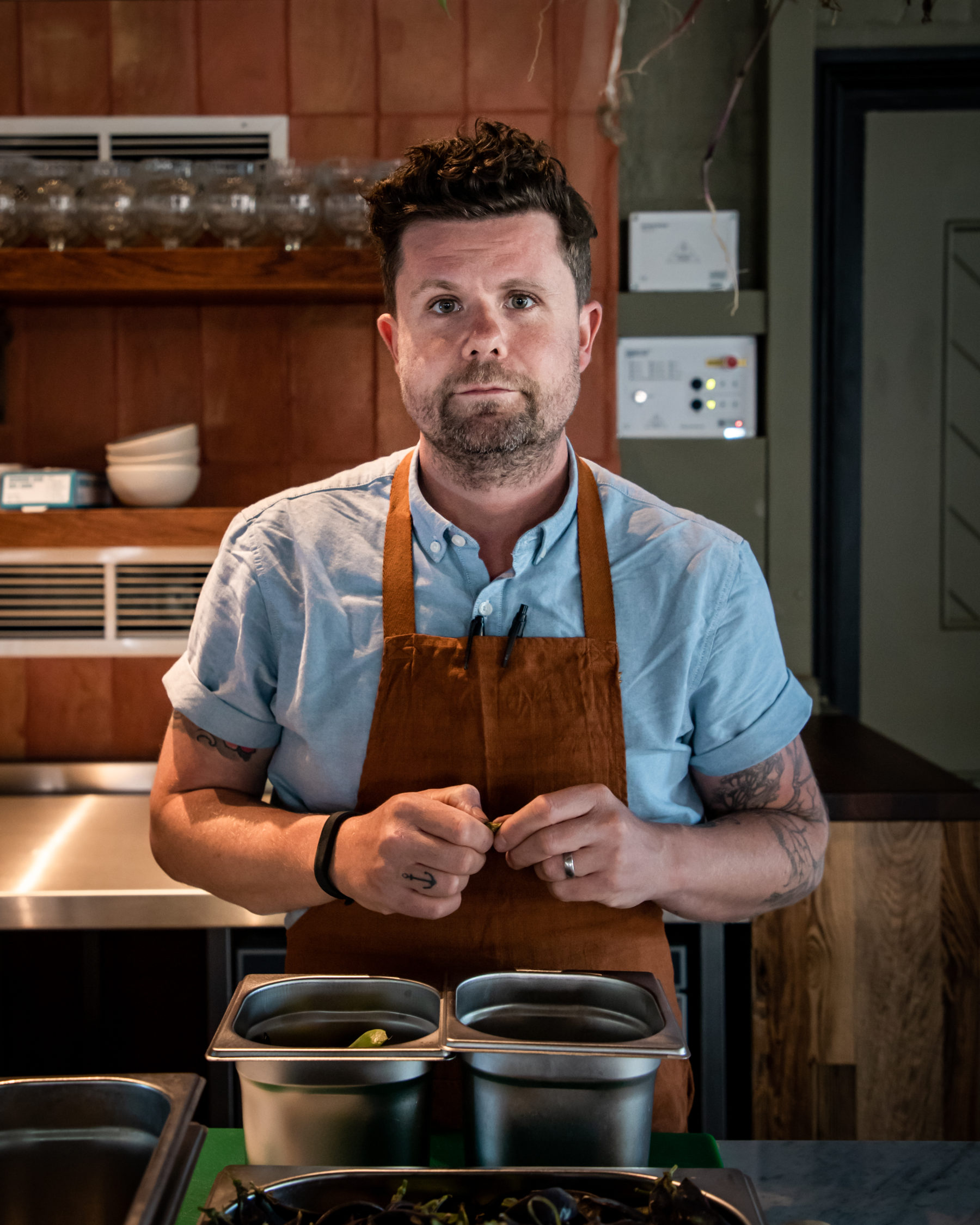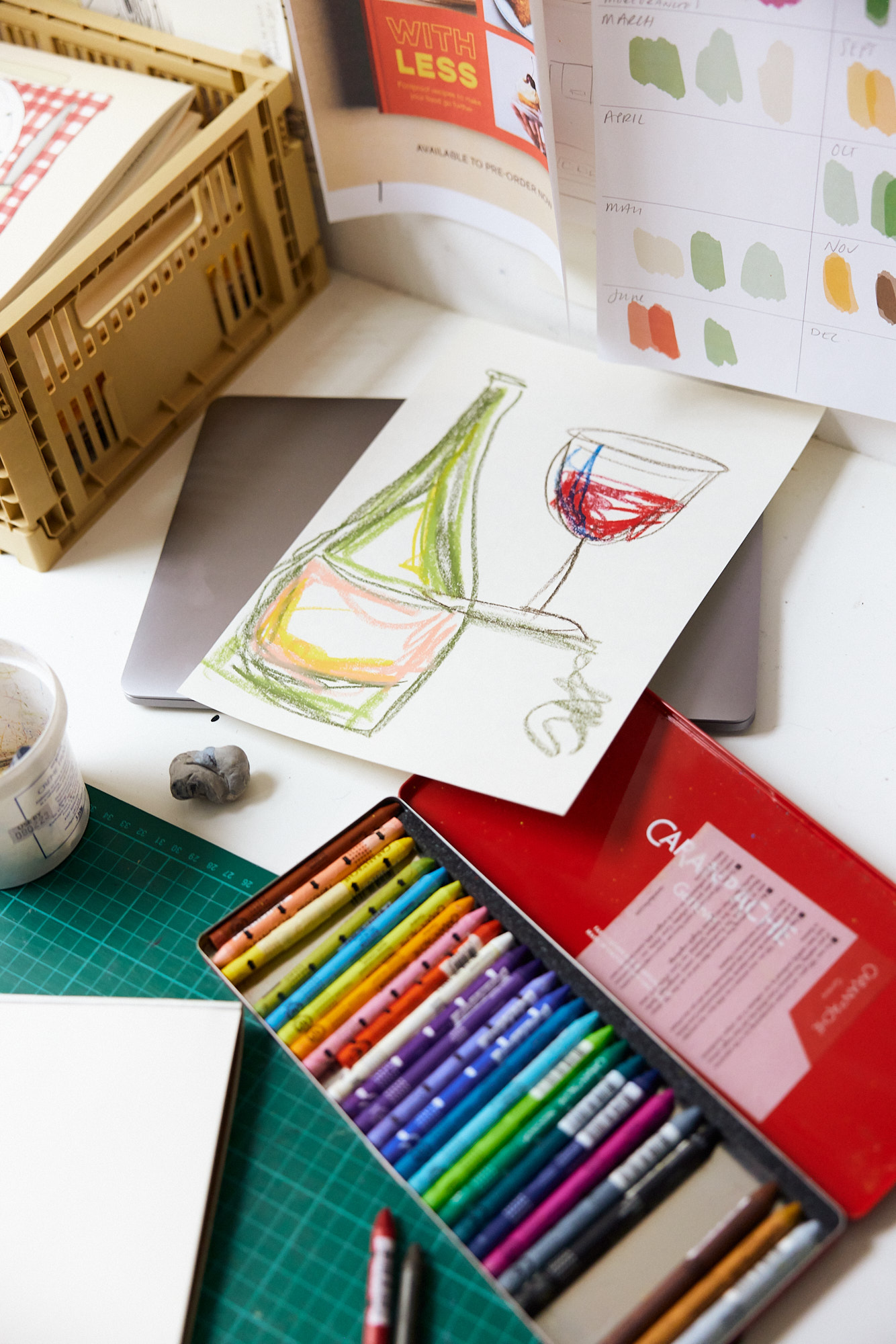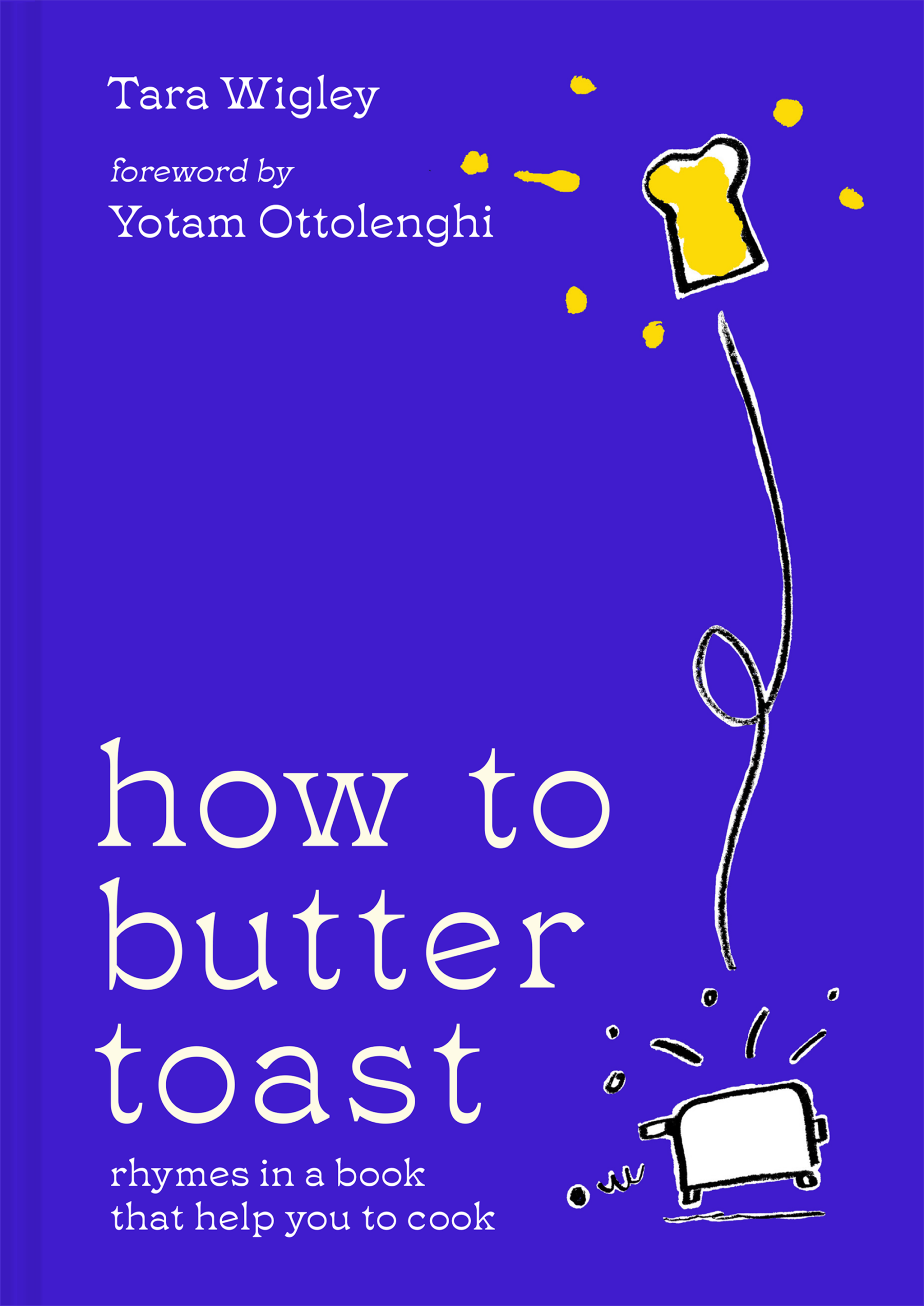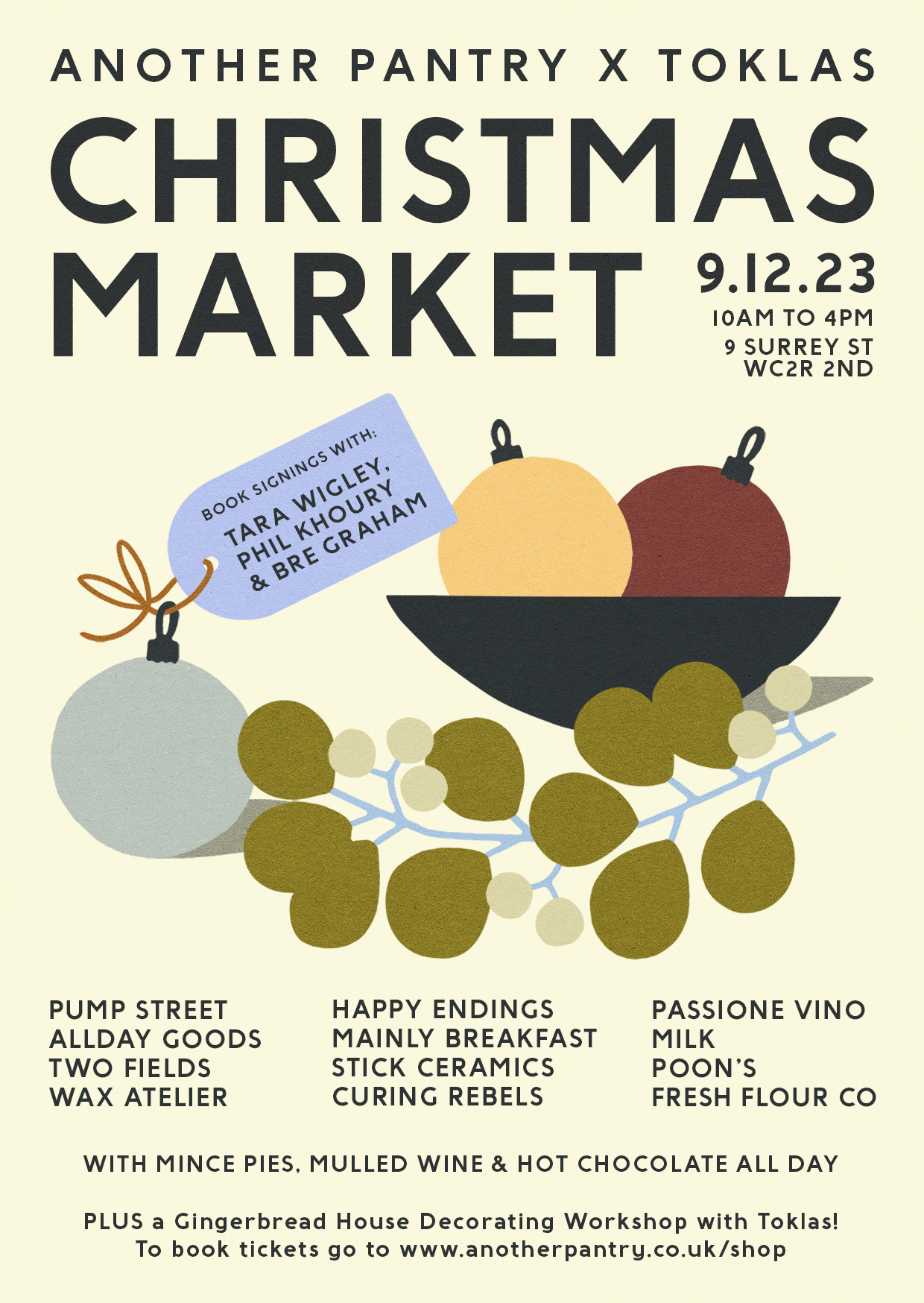
From The Kitchen Garden: At The Table With Robin Gill

You’ll probably know Robin Gill as the man behind The Dairy — the neighbourhood restaurant that brought seasonal small plates to Clapham back in 2013. Sorella, Counter Culture and Darby’s might sound familiar too. Perhaps you don’t yet know though that in 2019, Robin embarked on something a little bigger. Working his way north of the river, he now heads up the food at Birch, a retreat just outside central London.
It’s not immediately obvious from the stately exterior that much of Birch’s fifty-five acres of land are dedicated to food and farming. With a kitchen garden, a vegetable patch, beehives, as well as pigs, chickens and sheep, the food at Birch is very much led by nature and what grows on the land. We sat down with Robin to chat about his latest farm-to-table project and how this time, he is able to prioritise flavour, process, simplicity and nature in a way that he hasn’t before.
“I really admire cooks that take a vegetable like fennel and use it all, and just let it sit naturally on a plate. I think it’s easier to cook like that too. If you’ve got really nice produce that’s super fresh, it’s actually a much nicer and easier way to put food together.”
Robin, what brings you way up north from Clapham up to Cheshunt? What attracted you to Birch?
The space! I’ve always wanted to get involved in a space like this where we could grow on site. I thought I would probably do it in Ireland and didn’t ever get around to it, but I knew exactly what I wanted to do. I got introduced to the guys behind Birch through a mutual friend and we came up here to have a look about a month later, so I was involved from the really early stages.
The initial plan wasn’t necessarily as extensive as what we’ve ended up achieving — which is to grow our own produce, have a bakery, a few restaurants etc — but then we came up and mapped out the area, and it all very quickly became part of the planning. I then started to bring on people from my community and get them involved the project, like Ben Rand, who’s worked with me since we opened The Dairy.


Your cooking has always been defined by a seasonal, local food philosophy. Where did that love for cooking with nature and being in tune with the land come from?
I was exposed to it when I was very young. I used to go spend summers down with my auntie in Cork where she had an organic vegetable farm. My brother used to work there — he made bread all the time and he cured his own meats, so I would’ve seen it, but probably not taken that much notice of it as a kid. It was only when I started cooking that I was exposed to it a little bit more.
Then there was one place I worked at later on in particular in Naples in the south of Italy, Don Alfonso. He had a farm on the Amalfi Coast and it was so interesting to see how he operated it. The restaurant had two-Michelin stars and Don Alfonso used to spend all of this time in the farm and bring all the produce to the kitchen. It was almost like he was facilitating the cooks with a great kitchen and the best produce, and he was like ‘right, now make something nice with it!’.
The approach to the cooking was really simple. I was used to working in quite prestigious French restaurants where there was a lot more technique involved, but I liked the simplicity. As you get older you also get a little bit more confident doing things like that. When I first started cooking it was more like ‘okay, I can do 18 things to a cauliflower’, but now I know it doesn’t mean you should.
That kind of ‘farm-to-table’ attitude has been the natural way of life in most of France and Italy for a long time, but it’s only recently slowly been gaining more traction here in the UK thanks to chefs like yourself. Why do you think it’s happening now?
I think it’s a combination of things. It’s about the time the UK was influenced by what’s been going on in France and in Italy for many, many years. It’s really nice to see. What’s interesting is that you see more and more restaurants in the city being more obsessive about it. That was my goal when I was opening The Dairy, I wanted to try to emulate that farm-to-table philosophy as close as I could.
There was a time when people were looking at things like molecular gastronomy and honestly, I never liked it. It never sat right with me. Why would I want to make a powder out of this or that? It didn’t feel natural, so I’ve been really glad to see that culture changing and becoming very much more about the produce and zero wastage as well.
I admire cooks that take a vegetable like fennel and use it all, and just let it sit naturally on a plate as it is. I think it’s also easier to cook like that too. If you’ve got really nice produce that’s super fresh, it’s actually a much nicer and easier way to put food together.


You’ve always been focused on individual ingredients, even back when you had The Dairy. You had bee hives on the roof of the restaurant and honey was always a big part of the menu. Why did you decide to bring that over to Birch?
It’s that full circle thing. The honey and the bees became almost a signature of The Dairy, which essentially was a really tiny version of what we’re doing here.
You get that sense when you’re in the dining room from the pass, the open fire, the music — it’s about trying to create a great atmosphere but backed up by something that’s responsible and exciting, and completely produce and craft-led. It’s all the small things we learned to do at The Dairy and now I’m able to do it on a bigger scale.
It’s almost ironic that the closure of The Dairy happened as we were opening at Birch. They’re so similar.
You definitely have a lot more space to work with here. What does access to this land and this farm afford you both in terms of growing and cooking?
We’re only just starting the growing process and it needs a lot of planning, but it does allow us to be more creative. We’re going to have trial and error all along the way, but it’ll be exciting to see how it changes and how we can make sure that we’re getting things all year round. We’re working with Birch’s farmer Tom Morphew on that.
When you’ve got access to produce in abundance, there’s preservation as well. You ferment it and the flavours continue on and it gets really exciting. At the moment we’ve got some artichokes from last year and we’ve made elderberry vinegar too. You can jazz things up when you’ve got ferments and pickles from seasons before. If you can have something from summer to add to an autumn menu or vice versa, I think that’s really interesting.
Within the industry it’s easy to be in tune with those ways of cooking, but as home cooks it seems we have lost touch with seasonality and that sense of knowing where our food comes from. How can we go back to thinking about local, seasonal, carefully grown produce, not just in restaurants but in our homes?
It’s by searching out those farmers markets and by supporting them. There are more and more popping up all of the time. And if the consumers start to demand that, we might even see more locally farmed produce in the big supermarkets. I’ve even seen Lidl have started bringing in some decent produce from local farmers rather than the mass-produced stuff.
It’s strange — if you’re in a little village in France or Spain, there’s always a fruit and veg shop. What happened to those shops here? A lot of them have gone, but I think they’re coming back. During lockdown I saw two or three even pop up in Clapham which is great. Natoora is also a great example and you’re starting to now see them in supermarkets. They’re representing smaller farms, and it’s companies like that, they’re the ones that are big enough to have an impact and give the consumer access to that produce. It’s expensive but it should be expensive.


With the Zebra Riding Club you also place a lot of emphasis on wood-fired cooking, why is that?
We designed the kitchen in a way that meant we only have two induction hobs and everything else is led by fire. It’s a bit of a romantic way of cooking but it’s also a way of enhancing a lot of products. Not burning stuff, but enhancing them with a little element of smoke. It’s a really nice, natural way to cook and again, it just feels right. You’re not in this big glitzy lab-like kitchen with electricity everywhere. We feel like we’re craftspeople.
It’s good for the cooks too. There’s something really rewarding about building a fire and controlling it. We temper our ducks slowly over the wood and then blast them with a naked flame. I think the chefs feel like they’re actually cooking something. Thinking about the history of the estate, this is how people would’ve cooked 200 years ago, so we’re only trying to go back to how it was always done. It’s funny, we were credited with creating this new way of cooking or ‘modern gastronomy’, but there’s nothing new about what we’re doing whatsoever.
I’m not a preacher of sustainability but I am doing it because I enjoy it and it feels right for me. It then attracts the right people to come and work with us and eat with us too. It’s not to tick a box or because it’s fashionable. It actually takes a lot more work in some ways.
Are there any goals you have for the restaurant and the land for the future? What do you want to do next?
When we first sat down and planned, it was very much a discussion on how to be low impact on the environment and become completely self-sustaining.
In terms of growing, we’ve mapped out the areas — we want to bring back the walled garden, and we’re getting a polytunnel for the land down by the sheep. We’re saving all the pallets we get from deliveries to also build some raised beds. We might do a sunflower field too. We’re also about to develop our own charcuterie programme from our pigs, maybe we’ll have a dairy in time.
You know, I’d also love to invite other craftspeople onto the land. Let’s say we’ve got someone that wants to get into smoking and we gave them the space, they could smoke for us and sell their produce, and we could work together. It’d be nice to get a big proper orchard going on and our own cider. There’s also a massive cellar which we haven’t utilised yet, originally it would’ve been for storing vegetables and allowing them to mature, but we could have our preserves down there. It’s endless.
What’s in your pantry?
1. Aged parmesan
2. Capers
3. Really good olive oil
4. Tabasco
5. Anchovies




